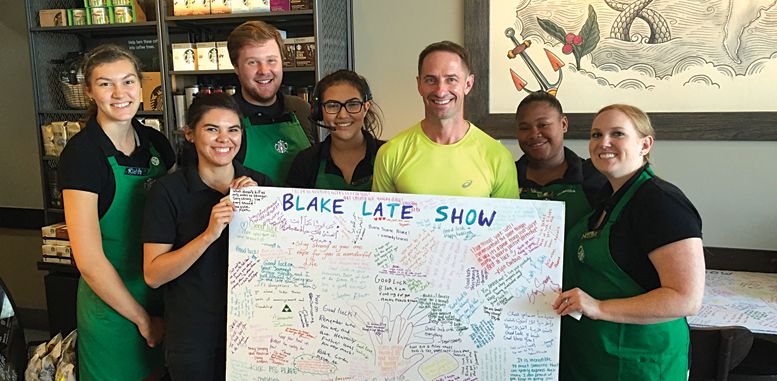By: Mike Givens/TRT Assistant Editor—
It happened on December 21, 2011.
“That night I was home in my seventh floor loft in downtown Phoenix and I woke up and it was happening to me,” said Ron Blake. “My domestic partner of so many years was drunk, he let two guys in … and I was held down and sexually assaulted that night and it was horrific for me.”
According to Blake, his partner, who he said had a history of substance abuse, invited two acquaintances into their home and the three proceeded to rape him. Making his way to his balcony during the assault, Blake was able to call the police.
Blake said he was disturbed by his partner and two acquaintances describing the assault as a misunderstanding, a situation that got out of control. Not wanting his partner of eight years to go to jail, Blake didn’t file charges.
“It wasn’t a misunderstanding,” he said. “I understood what had happened and it wasn’t good for me.”
“You’re angry at the world”
According to the National Intimate Partner and Sexual Violence Survey produced by the Atlanta-based Centers for Disease Control and Prevention (CDC), one in nine men are the victims of intimate partner violence, including rape. The study also noted 1.7 million men reported that they were the victims of rape or attempted rape in their lifetimes with one in nine men reporting that they experienced physical and sexual violence within an intimate relationship.
Blake and his partner would stay together for another two years after that December night. Between his partner and the two other men dismissing his purported rape allegation and what he described as severe confusion and pain that came with being violated by a loved one, Blake would spend those two years mired in uncertainty and self-doubt.
“The therapist said it was dissociative amnesia,” he said. “A lot of victims … and survivors have dealt with dissociative amnesia.
“It’s like looking in a mirror and it’s cracked. A lot of the pieces are there, but they’re just fragmented and I always told people after that night that I knew something happened that night I just didn’t want to talk about it.”
Blake said he never labeled the experience as a sexual assault in the months after that night and said that anger consumed him along with a feeling of needing to be isolated.
“I was such a gregarious person my whole life and I knew something was wrong at that point because there were three and four-month stretches where I would come home from my job and I didn’t want to be around people,” he said.
Suffering from explosive outbursts and an increasingly unhappy relationship with his partner, Blake said he took ownership of the assault and blamed himself.
“You’re angry at the world” were some of the final words Blake’s ex-partner said when the two ended their relationship.
After the breakup, Blake said that he was reading an article in Time Magazine about sexual assault and he finally accepted what happened to him on that evening. He filed a police report in August of 2016, but decided against pursuing criminal charges.
“I needed everything to stop”
In the summer of 2014, Blake started attending therapy to unpack and process the assault. By the summer of 2015, after a year of therapy and counselors, he was still struggling with depression and Post-Traumatic Stress Disorder (PTSD). One evening, it all came to a head.
Feeling as though the world was closing in on him, Blake took a mix of sleeping pills and pain medications.
“I knew the medications were contraindicated by the doctors, but by that point I needed everything to stop,” he said.
He woke up the next afternoon, still depressed, but alive. He continued seeing counselors and getting therapy, but still struggled with what he deemed as emptiness.
Blake described an almost zombie-like state of watching television without emotion or comprehension of what he was watching in the years after the assault.
On November 2, 2015, he’d have another watershed moment, but this one would signal a dramatic turning point.
“It was on that night that I tell everybody that everything for me began in a positive way,” he said. “There was a moment of laughter while I was watching the Late Show with Stephen Colbert.
“What was important about November 2, 2015 is when that show came on and I laughed it was the fact that I _recognized_ that I laughed. I paused the show for three minutes and just sat there and thought, ‘God, there’s still something good coming out of me. I’m going to do something with this laughter.’”
The Blake Project
“I went to bed with hope,” Blake said of the rest of the evening.
Determined to get on the The Late Show with Stephen Colbert and share his story with the late-night talk show host and his audience, Blake gained a sense of purpose.
He purchased eight poster boards at Staples the next day and on November 12, 2015 he began a campaign to gather signatures.
“I had this vision I would go on the Late Show and I would get up every day and start talking with strangers and reengage with society again,” he said.
He set about having conversations with complete strangers about his story: the alleged rape, the suicidal ideations and attempt, the isolation, the anger. The campaign started off as a petition, a way of documenting his efforts to engage the public about his experience with a goal of getting on the Late Show. He’d spend anywhere from two to 12 hours each day speaking to people.
“The reactions to him approaching always vary … but most people have stopped to listen to his story,” said Jay Roberts, who met Blake in 2015 at a networking event. “I’m pretty proud that he’s spreading the message and challenging people to become aware of the issue he faced. Most wouldn’t try something so bold.”
Blake said the people he met wouldn’t just write their signatures, they’d include poems, artwork, Bible verses, and other inspirational messages.
“Talking publicly and candidly about the issues that he has faced and removing some of the stigma is important,” said Andrew Thoesen, who met Blake at an event called Ignite Phoenix #18 in 2016. “It really broadens the conversation and helps other people not to suffer alone.”
The event is an opportunity for people to get on stage for five minutes and in a speedy presentation discuss their experiences and what they’re passionate about. Thoesen said he was scheduled to present after Blake that evening.
“I went immediately after he did, and there was some confusion because he got so much applause they actually sent him back out for a second round of applause,” he recalled. “It was a tough act to follow!”
In the spring of 2016, three Arizona State University (https://.asu.edu; ASU) students had an encounter with Blake that would give his work a signal boost.
Alicia Gonzalez, Sierra LaDuke, and Graham Bosch were taking a documentary film class together and ran into Blake while he was gathering signatures on campus.
“He told us his story and we signed his board,” LaDuke said. “After chatting with him for a few minutes, we went on our way. About 20 minutes later … we realized that this was the story we wanted to tell in our documentary.
“It was pretty amazing that all three of us so readily agreed on this subject. We all grew to love Ron and became passionate about championing his mission.”
The project culminated in a nearly 30-minute documentary called The Blake Project, which was nominated for a Rocky Mountain Emmy Award.
“What particularly stands out to me about Ron is that he has this aura about him, this energy that brings everyone up to his level,” said Bosch. “During the Phoenix Pride Parade last year, I followed Ron on his path up 3rd Street in downtown Phoenix and watched as he approached complete strangers to share his story. Within moments, he would have people crying or hugging him or sharing their own painful stories. I’ve never seen someone with such an intuitive understanding of human nature and other people’s emotions.”
A Robust Form of Therapy
As of mid-December, Blake said he has 23,663 signatures and messages on the more than 350 poster boards he’s used during his campaign. That includes roughly 1,200 personal stories shared. He estimates that he’s devoted more than 6,000 hours to the project and has signatures and messages in 86 languages. New Year’s Day marked the 782nd day of Blake’s unique form of therapy.
The most surprising aspect of his campaign is the mental impact he’s said it’s had.
“For 14 months now I haven’t needed to take any prescription pain meds, sleeping pills, or psych meds,” he said. “All of the medication I’m off of … I haven’t been to any professional or therapy sessions in 14 months.”
Blake credits the interactions with strangers, the stories shared, the hugs, and bonding over shared experiences.
Sydney Grover was at a downtown Phoenix coffee shop with a friend when Blake approached her and shared his story.
“Ron uses his pain to raise awareness … ,” she said. “He is someone who is driven by passion created from pain. When someone is so tragically broken, it can take years to find something to create happiness again.
A Champion, not a Victim
Blake attended an LGBT festival in Phoenix once and said that he told a group of about eight people his story. After sharing his story and asking for signatures on a poster board, one man in the group confessed that 15 to 20 years ago, when he first started coming out, he was raped.
“It was a powerful moment because all of his friends got up and hugged him,” Blake said. People were crying.”
The friends were asking why he’d never told them and he said that growing up in rural Oklahoma in small community as a young gay male, it was difficult to talk about rape.
Blake estimates that of the more than 1,200 stories he’s heard during his journey, between five and 10 percent come from gay men, but most predominantly come from women.
“I’ve been told by a lot of gay men who are raped that it’s a rite of passage and you have to just deal with it, buck up and move on,” he said.
“You should have known his reputation.”
“You learned your lesson.”
“You’ll know better in the future.”
Blake said he’s heard these lines before and that there’s an epidemic of victim blaming and gay men have often internalized the shame accompanying rape.
“Rape in our community is not a right of passage, just like for women, sexual harassment in the workplace is not a rite of passage,” he said. “You don’t have to deal with it, you don’t have to go through it.”
“What’s resonated the most is he’s become a champion to a cause rather than a victim,” said Roberts, Blake’s friend.
On March 2, Blake did a TEDx Talk, “Strangers, Hope, and Sharpie Markers Saved My Life ” and said he has also given three other similar public talks. As of mid-December, he’s reportedly spoken at 21 colleges and universities and other than Arizona has taken his campaign to the states of California, Illinois, Indiana, New Jersey, New Mexico, New York, and Texas.
“It’s been more than a year and a half since we premiered our documentary, but Ron is nowhere near finished,” said Bosch, the ASU alumni.







